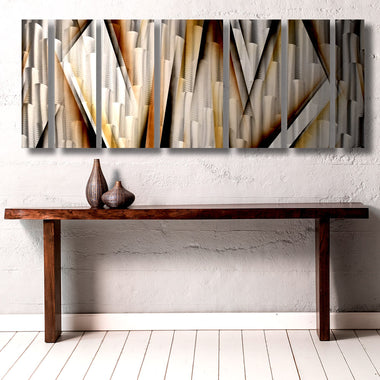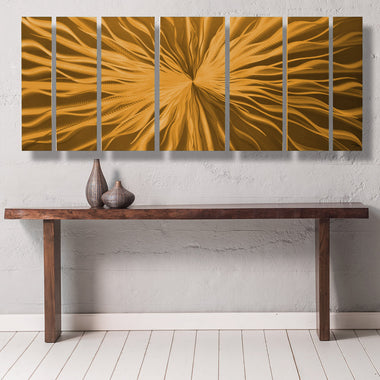Large Metal Wall Art
Learn More About Our Large Wall Art and Sculpture
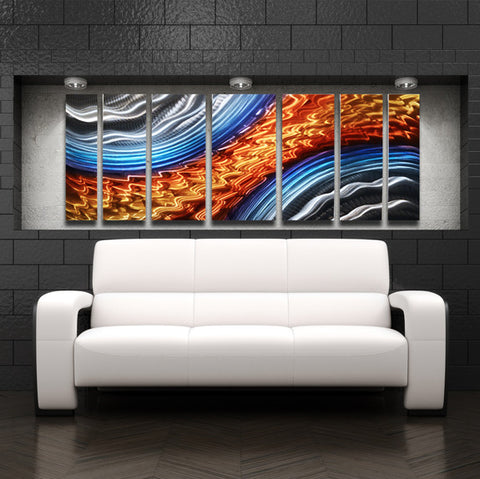
For many of these grand pieces, the expressive composition and style serve as a reflection of your unique style and personality. Many of our customers comment about the abundance of compliments they receive after installing the art in their home. Starting at 45 inches and measuring up to 76 inches wide, this artwork is sizable indeed, however most will weigh in at a very light eight to nine pounds and can be installed on virtually any wall surface. Nearly all designs will come with a full scale wall template that helps you hang the art perfectly in just a few minutes, and all include adjustable hangers to space the panels off your wall for that magical floating appearance! We even carry XL (Extra Large) Wall art for the extremely spacious areas of your home or office. We specialize in these awesome pieces, and are not only here to provide you with the very best handpicked selection of original work, but also give you all the information and support you may want about this amazing art!
We’ll outline some history on these sizable creations and discuss some details about the display, lighting, and maintenance of our current pieces.
History of the Genre
Metal art in general has a past of ancient and mythical proportions that dates back to the dawn of human existence. We talk a little more about that fascinating topic in our “History of Metal Wall Art” section if you care to pop over there and have a look. In this article we want to share a little about a relatively new development in the genre – the artwork in its larger form.
This exciting new format is based on one key element – sheet metal. It didn’t really exist much in its modern vintage before the eighteenth century, as sheet metal was not readily available in quantity…or for that matter, quality. Until then, small amounts could be hand worked into a thin sheet by various hammering and rolling methods, but uniform bigger sheets were not very common. Can you imagine swinging a five pound hammer day and night for a week or so to get a couple square feet of tin to work with? Ouch! Only softer metals could be thinned down with this crude technology of the time, and was not cost effective or durable to use as decor on a practical scale.
Corrosion was a big challenge and factor for early production, as rust would quickly chew away at the finish, not so good for art! With countless improvements implemented, sheet metal tooling became more efficient through the 19th century, and has essentially used the same mechanical processes ever since. It was much more possible to access and utilize the material during the industrial revolution. New technology allowed for abundant production of perfectly flat, anti-corrosive material, a breakthrough in manufacturing innovation! Lucky for us, right?
The number of metal artisans creating wall art on a larger scale began growing rapidly around the turn of the century. Most would create from scrap, as fresh stock was quickly absorbed by the military and big industry manufacturing everything from kitchen cabinets to airplanes with the material! This situation had an upside for art too, as many people finding new jobs in this sheet metal boom became artisans at using a variety of new tools such as welders, grinders, sanders, and polishing wheels. This paved the way for a massive new potential for the metal artist!
Common Metal Types Used
Today, the common materials used in bigger pieces can range from copper to steel and brass, with aluminum usually being the ultimate choice with excellent reflective qualities, corrosion resistance, and its light weight to boot! Our panels spanning over five feet wide still weigh in at only eight pounds or so, that’s very light! Pound for pound aluminum is roughly half the weight of its steel counterparts. There is a plentiful menu when it comes to the different types of aluminum that can be used (alloys as they’re designated), but the varieties incorporating magnesium, zinc, or copper allow for this light material to be rigid and suitable for big panels. The large metal wall art you see currently (such as on our website) starts off as a smooth and flat piece of 2000, 3000, or 5000 series aluminum sheet. Regardless of the alloy, the sheets originate from a massive coil of aluminum weighing many tons, which gets unwound like a spring and flattened out by special machines called levelers. Once cut down into smaller sizes, they become fresh aluminum canvases - ready to be transformed into spectacular artworks! The biggest pieces can measure over ten feet wide and five feet tall. They can then be sheared, rolled, punched, pressed, and bent into countless different shapes and sizes.
Popular Fabrication Methods
The methods used to sand, grind, and ultimately sculpt the subject matter on to the metal art is achieved through a mixture of many traditional techniques, and some very new innovative styles which take the art to a whole new level. Processes which were at one time used in a practical way to clean or finish sheet metal surfaces, are now re-invented as purely aesthetic means of texturing the material into fantastic patterns and designs. Even the tools originally designed to perform these sensible duties have been modified, re-wired and repurposed to convert their utilitarian uses into fantastic metal paint brushes capable of covering sizable compositions. Grinders, sanders, brushes and files are all full time employees in the contemporary metal artist's tool box, both electric and air powered, even the latest in CNC technology is put to use to create their visions.
Color Application
Color application has also recently made progress by leaps and bounds with innovative ways to apply pigment to semi and non-porous surfaces such as metals on a wider scale. To colorize their huge canvases, artists now have the very best paint, dyes, and inks ever developed. The techniques for applying paint, including HVLP spray gun applications similar to those used in automotive industry, and simple bristle or foam paint brushes, can range from primitive to high tech and may include any combination in a given piece.
All of these wonderful advancements have made the possibility of this grand sized artwork a reality. As innovation in the metal industry rapidly evolves, we look forward to the creative possibilities that will allow for the next generation of the genre, and hope to be a big part of it! I hope you have gained some new perspective and enjoyed this brief chronology on the history of the genre.
Display, Lighting, and Maintenance of our Large Metal Wall Art:
- Most pieces will be arranged in separate panels which break up the geometrical shaping and give the over-all work a multi - dimensional quality. Ranging from six to twelve inches in width, and twenty four inches in height, the common order of the panel width is (starting from the left) six, eight, ten, twelve, ten, eight, and six. Some pieces vary in configuration and will be specified in the product’s description. Common sizes for the overall piece will be about 68 inches wide by 24 inches high and Extra Large Metal Art versions are 76 inches wide by 30 inches high. They may be ordered in a solid single panel if requested before ordering (additional shipping charges may apply)

The special folding hanger brackets on our pieces are adjustable for stand-off distance. Stand-off distance is the space between your wall’s surface and the back side of the artwork. The default stand-off distance is zero inches because the bracket is folded flat on the back of the panel for shipping efficiency, this would place it directly against your wall (most everyone will want more than zero stand-off because it looks much cooler that way!) When suspended away from the wall, it creates a unique drop-shadow effect that makes the art appear to be floating. To create this spectacular floating appearance as seen on our photos you will want to have one and a half to two inches of offset from the wall. Don’t worry, that’s easy to accomplish! Simply fold the brackets as instructed at the perforated locations and expand them. Then hang on your fasteners like a traditional frame.
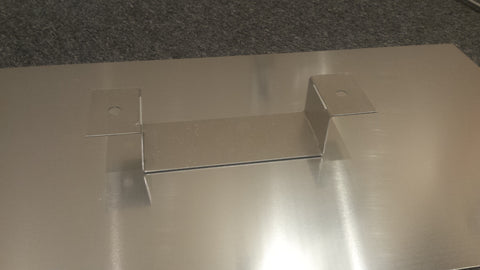
- Bright lighting is the best way to get dazzling reflections and dramatic contrast in color. For installations in excess of five feet wide, an LED or halogen track light setup is the recommended choice. These are becoming rather common in home improvement stores and are reasonable in price ranging from about $75 to $200 dollars for the preferred LED versions. They use a fraction of the power, and have a wide range of color choices (warm, white, and cool tones) If mounted near a window, natural day light can be a beautiful way to illuminate the artwork during the day.
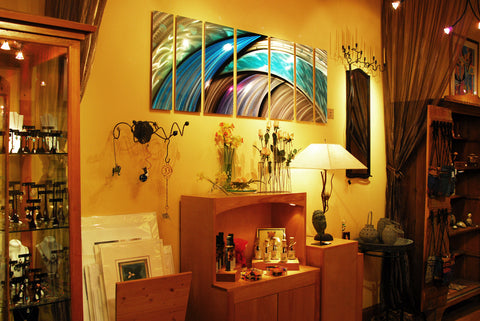
- Maintaining the appearance of your artwork is really minimal and quite simple – just wipe down with a damp micro-fiber towel to remove dust from time to time. Avoid touching and handling the art with bare hands as finger prints can be a little more difficult to remove. When taking down for storage or moving, fold the hanger brackets flat and separate each panel with a piece of smooth cardboard or thick moving paper. Wrap the bundle tightly in packing foam and secure in a box for transport.

